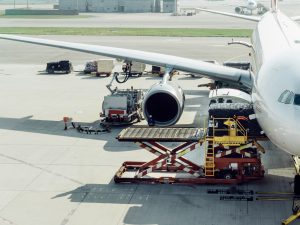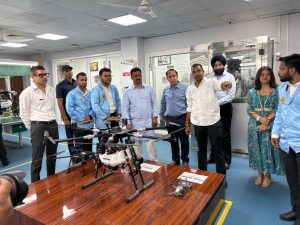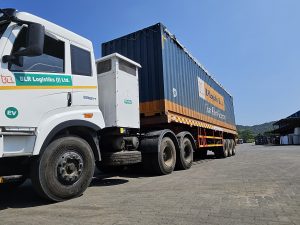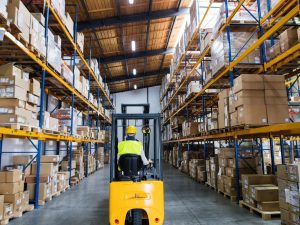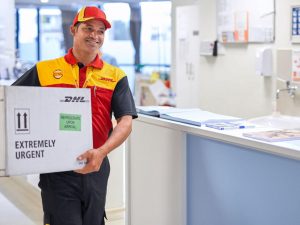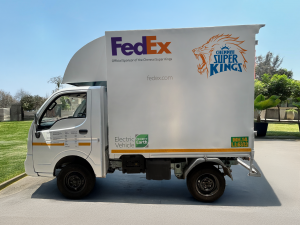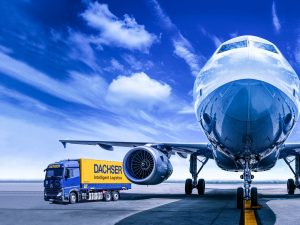The Air Cargo Agents Association of India’s President, C K Govil is proudly representing India as part of an elite delegation at International Civil Aviation Organisation (ICAO), first forum in Turkey to discuss global trade and logistics. Led by esteemed officials from the Civil Aviation Ministry —Piyush Srivastava, O.P. Sharma, Ajay Kumar, and senior representatives from the Ministry of Civil Aviation — this delegation is a testament to India’s growing influence in shaping the future of global air cargo and logistics sectors. Govil’s presence reflects India’s commitment to becoming a global logistics powerhouse, and we’re proud to be part of this bold vision for the future. Govil also had the opportunity to meet Ian Saunders, Secretary General of the World Customs Organization. He extended a warm invitation to him for our upcoming FIATA RAP event next month — paving the way for deeper international engagement and partnership.” He said, “Under the Government of India’s initiative to emerge as a true global leader, I am honoured to be part of the delegation of this esteemed committee, led by Piyush Srivastava, O. P. Sharma, Ajay Kumar, and other senior officials from the Ministry, attending this significant event. With over 500 participants from nearly 80 countries, this global gathering reflects India’s growing stature on the international stage and our collective commitment to shaping the future of global trade and logistics.”
Read More »Global demand for e-commerce hit due to tariffs imposition: Xeneta
As per Xen As per Xeneta’s latest findings, E-commerce volumes, for so long the saviour of global air cargo demand, are now facing up to the ‘seismic shock’ of the United States’ ‘Liberation Day’ global tariffs announcement, while the general cargo market is also reevaluating its future as shippers, forwarders, airlines, and consumers come to terms with the economic reality of new import taxes and a potential international trade war. US President, Donald Trump, yesterday confirmed the elimination of duty–free de minimis treatment for low-value imports from China and Hong Kong, starting 2 May 2025. All relevant postal items valued at or under USD 800 previously qualifying for the de minimis exemption will become subject to a duty rate of either 30% of their value or USD 25 per item (increasing to USD 50 per item after 1 June 2025). The announcement was one of many as President Trump imposed sweeping global import taxes on goods into the United States from 9 April 2025. Already reeling from the potential impact of the US’ actions, global air cargo demand is likely to suffer further harm from retaliatory actions by other countries. EU President, Ursula von der Leyen, called the US decision “a major blow for the world economy.” After more than a year of double-digit growth, air cargo now faces an uncertain future. “In my 30 years working in the air freight industry, I cannot remember any other unilateral trade policy decision with the potential to have such a profound impact on the market at a global level,” said Xeneta’s Chief Airfreight Officer, Niall van de Wouw. “E-commerce has been the main driver behind air cargo demand. If you suddenly and dramatically …
Read More »AVPL plans to invest $12 million in drones in next 24 months
AVPL International has announced a $12 million investment to support the country’s growing drone ecosystem within the next 24 months. The company has set up 31 Drone Aero-Vision Labs in India, onboarded 30 Remote Pilot Training Organisations (RPTOs) across the country, laid the foundation stone to establish two manufacturing units, and is co-building a robust AI powered agriculture drone with IIT Kanpur. AVPL is also building India’s largest RPTO in Hisar, a ₹15 crore facility in Bihta, Bihar, alongside a key drone production unit in Hisar, Haryana. Together, these projects form part of AVPL’s broader vision to train the new generation of drone pilots and entrepreneurs, while boosting domestic manufacturing. The announcement was made at a launch event attended by Union Minister of State for Rural Development, Kamlesh Paswan, who visited the event to understand the on-ground implementation of drone didi scheme across the country, BJP National General Secretary, Tarun Chugh also attended the event virtually. Many industry leaders like Naveen Parashar (CMD, SN Capital) and Uday Pal Singh (CEO, Innovision Ltd.) also commended the company’s initiatives. “With drones transforming how we farm, build, and connect, this kind of investment helps equip our youth with future-ready skills,” said Paswan. “It’s a big step towards empowering rural India, and such initiatives will contribute immensely to the youth and women in our hinterlands.”
Read More »IKEA deploys first heavy-duty electric truck in India
IKEA Supply, part of Inter IKEA Group and BLR Logistiks, have deployed the first electric heavy-duty truck to run on the public road network in India. The deployment phase started in October 2024, and the truck recently completed its 100th journey transporting IKEA products between the port of Mumbai, the distribution centre (DC) in Pune, and the IKEA store in Mumbai. “Although the purchase price of electric vehicles is higher than diesel trucks, we have achieved higher efficiency and cost reductions in the long term. This is an important step for IKEA and a strong signal to the transport sector in India,” says Claes Lindgren, Acting Category Transport Manager, IKEA Supply Chain Operations. “Through a joint effort with our partner, we have optimised the route, ensuring the truck is used more on the road and less during idling in loading and unloading processes.” The deployment has been made possible through a close collaboration between IKEA and its carrier BLR Logistiks, as well as other partners. Apart from reducing greenhouse gas emissions from transportation, it has also generated significant efficiency gains: Reduced turnaround time from 2 to 1 days 16% cost reduction per year 30% reduction in greenhouse gas emissions, totalling 206 tons, for the specific route each year Reduced empty runs by around 160,000 km per. In most cases, EV trucks have a significantly higher purchase price compared to traditional diesel trucks. Furthermore, large investments in charging infrastructure are usually required, and it is crucial to rethink route optimisation to ensure EV trucks idle as little as possible. Previously, the 120 km three-stop route was shared by two conventional trucks: one driving between the port and the DC and the …
Read More »Logistics & industrial space leasing up by 18.5% in Jan-March: Savills
According to Savills India’s latest report, leasing of logistics and industrial spaces rose 18.5 per cent in January-March this year to 160 lakh square feet across 24 cities on better demand. The leasing of industrial and logistics spaces stood at 135 lakh square feet in the year-ago period across 24 tier I-II-III cities. Real estate consultant Savills India data showed that Tier-I cities accounted for 79 per cent of the leasing activities, while Tier-II and Tier-III cities contributed 21 per cent. Tier- I cities include Ahmedabad, Bengaluru, Chennai, Hyderabad, Kolkata, Mumbai, Delhi-NCR, and Pune. Tier- II and Tier-III cities include Guwahati, Bhubaneshwar, Patna, Hosur, Coimbatore, Rajpura, Lucknow, Jaipur, Nagpur, Surat, Indore, Kochi, Hubli, Vizag, Belgaum and Anantapur. Savills noted that manufacturing segment accounted for 30 per cent of the total absorption of industrial and logistics spaces in January-March 2025, followed by the 3PL (third-party logistics) players at 26 per cent, retail segment 12 per cent, e-commerce segment 10 per cent and FMCG & FMCD segment at 9 per cent. Moreover, the new supply of industrial & logistics spaces rose 23 per cent to 159 lakh square feet in January-March 2025 from 129 lakh square feet in the corresponding period of the preceding year. In the new supply, the data showed that Tier-I cities contributed a substantial 12.4 million square feet (78 per cent and Tier-II and Tier-III cities added 3.6 million sq ft (22 per cent).
Read More »DHL Group plans over €2 billion investment in healthcare & life sciences
DHL Group has announced a strategic investment of €2 billion over the next five years to enhance its logistics capabilities in the life sciences and healthcare sector. This investment supports the Group’s ‘Strategy 2030’ and reinforces DHL’s commitment to helping healthcare customers grow, innovate, and serve patients more effectively worldwide. With 25 per cent of the investment allocated to the Asia Pacific, 50 per cent to Americas, and 25 per cent to the EMEA region, DHL is expanding its global footprint to deliver integrated, faster, more reliable, and patient-centric logistics solutions wherever healthcare companies operate. The investment will focus on enhancing high-quality infrastructure and technology across all logistics touchpoints – from storage, order fulfillment, and distribution to global shipping and last-mile delivery – creating even more resilient, scalable, and responsive supply chains for customers. A significant part of the investment will be allocated to establishing new cross-divisional GPD-certified Pharma Hubs for multi-temperature shipments lanes, expanding cold chain capacity in existing facilities, commissioning new temperature-controlled vehicles, and enhancing both passive and active packaging solutions to ensure sustainable delivery. As the demand grows in critical areas such as clinical trials, biopharma, and cell and gene therapies, DHL is also investing in high-quality, specialized cooling infrastructure to accommodate low and ultra-low temperature ranges. Additionally, the Group will implement cutting-edge IT systems that provide end-to-end visibility, ensuring product integrity, regulatory compliance, and confidence for healthcare providers and their patients. With its new sector brand DHL Health Logistics, the Group consolidates its life sciences and healthcare expertise under one unified umbrella. This creates a seamless, end-to-end experience for customers, simplifying the management of complex, cross-border supply chains with confidence, agility and high-quality service. The approach …
Read More »FedEx deploys EVs in Mumbai to boost last mile deliveries
Federal Express Corporation (FedEx) is enhancing sustainable logistics in India by deploying additional electric vehicles (EVs) in Mumbai for last-mile delivery. The recent addition of 13 TATA Ace EVs in Mumbai brings the total number of electric vehicles in operation across key Indian cities, including Delhi and Bengaluru, to 59. These efforts align with the FedEx goal to achieve carbon neutral operations globally bu 2040. “FedEx was the first global delivery company to introduce hybrid-electric vehicles back in 2003, and our journey with battery-powered vehicles began even earlier in 1994,” said Suvendu Choudhury, vice president operations and planning and engineering, India, FedEx. “Building on this legacy, we’re proud to do our part in reducing emissions and advancing sustainable logistics in India. Our phased, pragmatic approach to fleet electrification ensures we continue to deliver for our customers while minimizing our carbon footprint.” In a move that combines sustainability with brand synergy, FedEx has unveiled FedEx-CSK co-branded EVs in Mumbai, Delhi, and Bengaluru, reinforcing its commitment to delivering goods responsibly. As an Official Sponsor of the Chennai Super Kings, this initiative represents a powerful connection between two brands built on speed, precision, and excellence. These co-branded vehicles amplify the company’s presence in India, reinforcing its ongoing investment in the market. Electric vehicles are revolutionizing logistics by providing a smart, clean, and efficient solution for last-mile deliveries. Beyond reducing carbon emissions and air pollution, they align with the growing consumer preference for sustainable business practices. Consumer expectations for sustainability are rising, with research commissioned by FedEx revealing that 90% of Indian consumers prefer businesses that prioritize sustainable practices—making EV adoption a strategic advantage. By continuing to expand its EV fleet, FedEx is advancing …
Read More »CargoAi unveils CargoMART Interline to enhance airlines connectivity
CargoAi is proud to announce the launch of CargoMART Interline, a groundbreaking solution that streamlines and enhances interline cargo bookings. Now live with multiple airlines, including Emirates SkyCargo, this innovative tool digitises and automates interline capacity checks and e-bookings, unlocking new revenue opportunities and setting a new industry standard. For decades, the air cargo industry relied on manual interline booking methods, communicated through emails and phone calls, and fragmented systems to finalise interline bookings. This led to operational bottlenecks, missed revenue, and limited scalability. CargoMART Interline will transform this approach. With CargoMART Interline, airlines can now: ✅ Instantly check and book interline capacity – No more emails or phone confirmations. ✅ Optimize revenue with seamless interline partnerships – Unlock additional capacity with minimal effort. ✅ Scale efficiently using existing APIs – No heavy IT investment required, easy onboarding. ✅ Prepare for the next step: direct interline booking for freight forwarders – Expanding airline reach on pre-approved lanes. CargoMART Interline was developed and rigorously tested with Emirates SkyCargo, a key partner in shaping this game-changing solution. However, the platform is not exclusive—it is designed for rapid adoption by any airline with API connectivity (107 currently available with CargoAi), ensuring quick implementation with minimal technical effort.
Read More »Welspun One secures Rs 2300 cr funding for MMLP at JNPA
Welspun One has secured Rs 2,300 crore construction financing from the National Bank for Financing Infrastructure and Development (NaBFID) for its flagship logistics park project at Jawaharlal Nehru Port Authority (JNPA). The JNPA logistics park, spanning 55 acres, is its largest logistics development in India, it said. The funding by NaBFID is a 22-year term loan project. “While we have financed other warehousing projects, this project is unique as it comes up in a SEZ and is being built to international standards,” said Samuel Joseph, DMD, NaBFID. Located within the JNPA Special Economic Zone (SEZ) in Navi Mumbai, with a total development potential of over 3.6 million square feet, the industrial and warehousing facility will cater to e-commerce, 3PL, FMCG, and manufacturing sectors. Securing this funding ensures the timely execution of the JNPA project, reinforcing Welspun One’s commitment to large-scale infrastructure development, the company said in its statement. “This park will set new benchmarks in efficiency and scalability, supporting India’s growing demand for high-quality warehousing solutions. With NaBFID’s support, we are positioned to accelerate execution, while continuing to drive long-term value for our stakeholders,” said Anshul Singhal, Co-Founder and Managing Director, Welspun One. Comments
Read More »Dachser records 14% YoY growth driven by air & sea freight
With large acquisitions and developments, Dachser grew significantly in 2024, with sales growth of 13 per cent lifting revenue above the 8 billion mark to EUR 8.027 billion. The family-owned company also recorded significant year-over-year increase in other key figures such as headcount (+3,300), locations (+56), and pallet spaces in its warehouses (+720,000). This growth is largely due to the acquisitions of DACHSER & FERCAM Italia, Frigoscandia, and Brummer, which will appear on the balance sheet for the first time in 2024. In purely organic terms, i.e., excluding acquisitions, Dachser grew by 4.7 percent compared to the previous year. This was driven by resilience in its European groupage network and rate increases in air and sea freight. Transported volumes rose by 7.6 percent to approximately 83.2 million shipments, while tonnage increased by 10.2 percent to some 44.1 million. Business development would have been more dynamic, but there was a lack of growth impetus from Germany and Europe: “High costs, weak industrial production, and a decline in personal consumption have also had an impact on our business. Moreover, the many crises we face around the world today have been a constant stress test for our customers, and hence also for us,” says Burkhard Eling, Dachser CEO.
Read More » Cargo Breaking News
Cargo Breaking News

